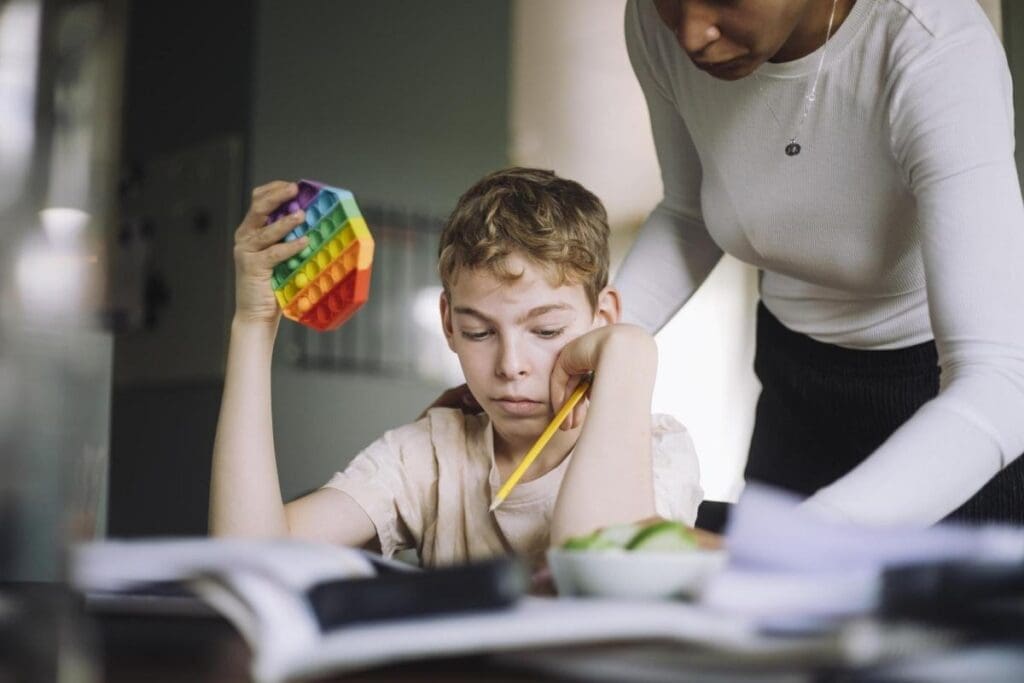Last Updated on November 20, 2025 by Bilal Hasdemir
Bedtime can be tough for people with. They often find it hard to fall asleep, wake up a lot, and have restless sleep.

A Turkish study found that 26.2% of adults with ADHD have clinical insomnia. Also, 85.2% say their sleep quality is poor.
We’ll look at the sleep challenges people with ADHD face at night. This includes trouble falling asleep, waking up a lot, and restless sleep.
It’s key to understand how ADHD and sleep interact. ADHD is a disorder that affects how people focus, act, and control impulses. People with ADHD often have trouble sleeping, which can make their ADHD symptoms worse.
ADHD and sleep issues are linked in a complex way. ADHD can mess with brain activity, affecting sleep. Those with ADHD are more likely to have sleep problems like insomnia and sleep apnea.
The brain’s chemicals, like dopamine and norepinephrine, are important for both focus and sleep. In ADHD, these chemicals are out of balance. This can make it hard to sleep well.
Sleep issues can really impact daily life for those with ADHD. Poor sleep can make ADHD symptoms worse. It’s hard to do everyday tasks and think clearly.
Also, sleep problems can make emotions harder to control. This can lead to mood swings and stress. It’s a cycle where sleep issues make ADHD symptoms worse, and those symptoms make sleep harder.
ADHD can make it hard to fall asleep. People with ADHD often face bedtime challenges that affect their sleep and health.

Many with ADHD struggle to sleep even when they’re tired. This is due to how ADHD affects sleep. Studies show that ADHD can change sleep patterns, making it tough to sleep well.
This issue can lead to chronic sleep deprivation. It makes ADHD symptoms worse. A study found that those with ADHD often feel “wired and tired” at night. This shows a big gap between feeling tired and actually sleeping.
This gap can hurt sleep quality and daily life.
ADHD also brings the “racing mind” issue. As night falls, the mind can get busy, making it hard to relax. This can be due to unfinished tasks, stress, and anxiety.
To calm the mind, people with ADHD can try mindfulness, meditation, or journaling. These can help quiet the mind and get ready for sleep.
Delayed Sleep Phase Syndrome (DSPS) is common in ADHD. It makes it hard to fall asleep on time. DSPS can cause problems like waking up late and feeling sleepy during the day.
It’s important to understand and manage DSPS for better sleep. A regular sleep schedule and a good sleep environment can help regulate sleep.
Sleep problems are common in people with ADHD, affecting their health. The link between ADHD and sleep issues is complex. Studies show how serious this problem is.
Adults with ADHD have a much higher rate of clinical insomnia than others. A shocking 26.2% of them suffer from it. This shows we need to focus on helping them.
Most people with ADHD don’t sleep well, with 85.2% saying their sleep is poor. This shows how widespread sleep problems are in ADHD.
Young adults with ADHD often don’t get enough sleep. This affects their daily life and health. Studies show they often don’t sleep enough, making ADHD harder to manage.
To understand the issue better, let’s look at some key statistics:
| Statistic | ADHD Population | General Population |
| Clinical Insomnia Rate | 26.2% | 5-10% |
| Poor Sleep Quality | 85.2% | 20-30% |
| Sleep Duration Deficits | High Prevalence | Moderate Prevalence |
The statistics show a big difference between ADHD and the general population on sleep issues. ADHD people need special help and care.
ADHD isn’t just a daytime issue. It also affects sleep, causing restless nights and frequent wake-ups. These problems can really hurt the quality of life for those with ADHD.
Research shows ADHD brains often have messed-up sleep patterns. This messes up sleep quality, making mornings hard to wake up feeling good.
People with ADHD might have more sleep breaks. This means they wake up a lot and can’t sleep straight through.
| Sleep Stage | Normal Sleep Pattern | ADHD Sleep Pattern |
| Light Sleep | Typically constitutes 50-60% of total sleep time | May be increased, contributing to poorer sleep quality |
| Deep Sleep | Crucial for restorative processes | Often reduced, potentially affecting physical and mental restoration |
| REM Sleep | Essential for cognitive functions and memory consolidation | May be disrupted, potentially impacting cognitive performance |
Keeping sleep steady is hard for those with ADHD. They often wake up a lot, messing up their sleep cycle. This leads to sleep that doesn’t feel restful.
Things like being easily excited, feeling stressed, and ADHD’s brain differences make it tough. Working on these issues can help sleep stay steady.
ADHD often means feeling tired in the morning. This tiredness can make ADHD symptoms worse, like not paying attention and being too active.
Feeling tired in the morning can also hurt work, school, and social life. Fixing sleep problems is key to helping ADHD.
Stress and ADHD at bedtime can make it hard to sleep well. This happens when normal stress causes big sleep problems in people with ADHD.
People with ADHD get stressed easily, leading to insomnia. Even small stressors can start a chain of events that mess up sleep. This makes it hard to fall or stay asleep.
For example, someone with ADHD might worry about tomorrow’s tasks or an upcoming event at night. This racing mind is hard to stop, making sleep even tougher.
The link between sensitivity and sleep issues in ADHD is complex. Studies show that ADHD sleep patterns are different. This makes them more likely to have sleep problems.
Stress can make these sleep issues worse, creating a cycle. To improve sleep, it’s key to tackle both stress sensitivity and sleep challenges. This way, people with ADHD can get better sleep and feel better overall.
ADHD is more than just trouble focusing and being too active. It also messes with sleep, causing nightmares and weird dreams. People with ADHD face a tough battle with their sleep, thanks to their brain’s unique challenges.
Studies show that ADHD folks have more nightmares and scary dreams than others. This is because ADHD affects how the brain handles emotions, even when we’re sleeping.
Research has found that trying to process emotions in sleep can lead to bad dreams. This makes sleep even harder for those with ADHD.
Having nightmares and scary dreams can make people anxious about sleep. This anxiety keeps them awake, starting a cycle of sleep trouble.
“The fear of having nightmares can be as distressing as the nightmares themselves,” showing how tough dream troubles can be for ADHD folks.
The emotional processing theory says dreams help us deal with our feelings. For ADHD people, this might mean more nightmares. Their brains might be working overtime to process emotions.
“Dreams are a reflection of our brain’s attempt to process and make sense of our emotional experiences. In ADHD, this process can be intensified, leading to more frequent nightmares.”
This theory helps us understand why ADHD folks have more nightmares. It also shows how these dreams affect their sleep problems.
For those with ADHD, sleep issues can make symptoms worse, creating a cycle. The link between ADHD and sleep troubles is complex. Poor sleep can make ADHD symptoms more severe.
Poor sleep can make ADHD symptoms like inattention, hyperactivity, and impulsivity worse. Without good sleep, people with ADHD find it harder to focus. This can hurt their work and school performance.
Sleep disturbances also make it tough to control impulses and activity. This is a big problem in places like work or school.
Sleep problems affect ADHD symptoms in many ways:
It’s key to understand this cycle to find ways to manage it. By tackling sleep issues, people with ADHD might see some of their challenges lessen.
Fixing sleep issues is key to managing ADHD well. We’ve learned how ADHD and sleep problems make a bad cycle. Poor sleep makes ADHD symptoms worse, and ADHD symptoms can also disrupt sleep.
Working on ADHD sleep problems helps manage symptoms better. This improves life quality. Studies show many people with ADHD also have sleep disorders.
To break this cycle, we need a full plan to boost sleep quality. This way, those with ADHD sleep disorder can see better symptom control and feel better overall.
We stress the need for a detailed plan to tackle ADHD and sleep issues together. By focusing on sleep, people with ADHD can make a big leap towards better managing their condition.
People with ADHD often find it hard to fall asleep. They wake up a lot and have restless sleep. This can really affect their daily life.
ADHD can mess up sleep patterns. It can lead to insomnia, poor sleep quality, and not sleeping enough. This can make daily life tough.
Many adults with ADHD have trouble sleeping. About 26.2% have clinical insomnia. Also, 85.2% say their sleep is poor.
People with ADHD get stressed out easily. This makes them more likely to have insomnia and other sleep problems.
Yes, they often have scary dreams and dream-related anxiety. This is because of how their brain processes emotions.
Bad sleep can make ADHD symptoms worse. This includes being less focused, more active, and impulsive. These symptoms can then make sleep worse, starting a hard cycle to break.
Yes, fixing sleep issues can help manage ADHD symptoms. This can improve overall well-being and break the ADHD and sleep problem cycle.
Sleep needs vary, but ADHD might need more sleep. They might need better sleep quality too.
Restless sleep and waking up a lot can cause morning tiredness. This can affect daily life and overall well-being for those with ADHD.
Delayed sleep phase syndrome can make it hard to get good sleep. This can hurt overall well-being and daily functioning.
Weir, K. (2020). The ADHD-Sleep Link. Monitor on Psychology, 51(2). https://www.apa.org/monitor/2020/03/adhd-sleep
Yoon, S. Y., Kim, S. J., Kim, H. G., et al. (2020). Sleep problems in adults with ADHD: a systematic review and meta-analysis. Journal of Attention Disorders, 24(1), 10–23. https://doi.org/10.1177/1087054717753177
Becker, S. P., **S. **F. Gregory, J., **S. **H. Gregory, S. J., et al. (2019). The relationship between sleep problems and ADHD in children and adolescents: a systematic review. Journal of Sleep Research, 28(4), e12822. https://doi.org/10.1111/jsr.12822
Faraone, S. V., **S. **L. Biederman, J., & **S. **A. Spencer, T. (2015). Attention-deficit hyperactivity disorder: a clinical review. The New England Journal of Medicine, 373(15), 1435–1443. https://doi.org/10.1056/NEJMra1314568
Dimitriou, D., **S. **S. E. A. **S. **A. V. M. S. C. (2017). Sleep and wakefulness in children with attention-deficit/hyperactivity disorder. Sleep Medicine Clinics, 12(4), 517–523. https://doi.org/10.1016/j.jsmc.2017.07.004
Subscribe to our e-newsletter to stay informed about the latest innovations in the world of health and exclusive offers!